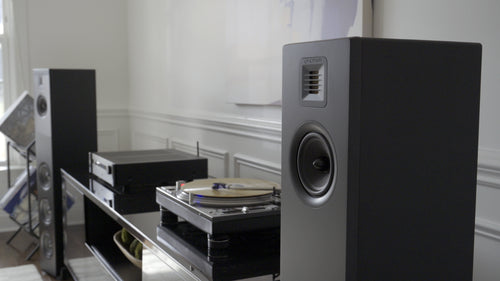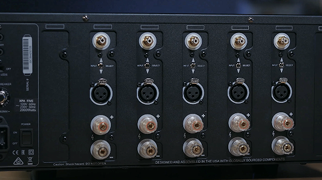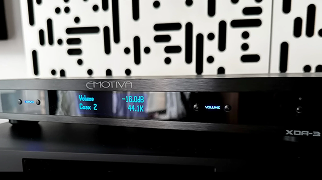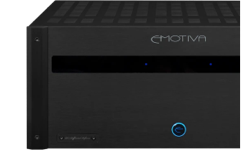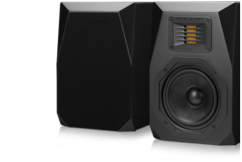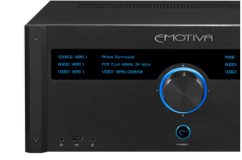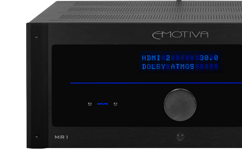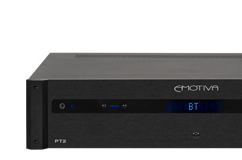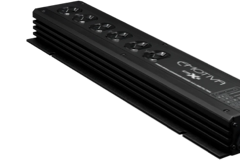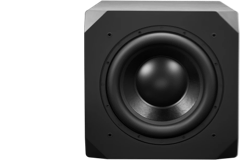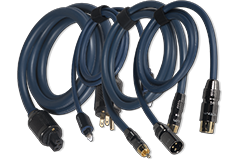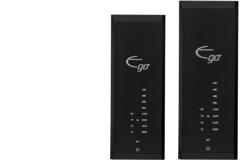
What makes an amplifier unique?
An amplifier is an electronic device charged with powering your choice of loudspeakers. Amplifiers come in a different variety of shapes, sizes, and configurations, from high power to low, single channel, stereo channel, and all the way up to multichannel. A channel in this instance refers to the number of loudspeakers that your particular amplifier is capable of driving at any one moment.
A monoblock or single channel amplifier means that it can power just one speaker at a time. A stereo or two channel amplifier can power two speakers at one time. Multichannel amplifiers come in a variety of channel sizes but the most common you will find with Emotiva will be a 3, 5, 7, 9 or 11 channel amplifier meaning enough channels to power the same amount of speakers.
Choosing the right amplifier for your system isn’t as difficult as you might think. There are just two things that you have to take into consideration when deciding which amplifier is going to be right for you or your system.
How to best match an amplifier to your system.
The first thing you are going to want to look at is your loudspeaker’s impedance. This is often given as a number of 4 or 8 Ohms and luckily most amplifiers are rated at both 4 and 8 ohms.
Now that you have determined that both your loudspeakers and amplifier are compatible because they are both rated at either a 4 or 8 ohm load, then we must look at our loudspeaker’s sensitivity.
Speaker sensitivity is often listed on a loudspeaker as a series of numbers, letters, distances, etc. It’s not uncommon to see something like 90dB @ 1w/1m. What does that mean when you see this information? With 1 watt of power, sitting 1 meter away from your loudspeaker, you can expect a volume output level of 90 decibels.
Some examples of dB levels that you might be familiar with: 40 dB would be equivalent to a quite conversation, 70dB would be the level of a busy outdoor street, 80dB is the average home stereo volume, 100dB would be the equivalent of a subway train. Once you get into the 120 dB range you approach the volume of an Airplane on a runway with potential hearing damage and 150 dB would be the equivalent of a jet engine up close, which would give you definite hearing damage.
How much power do I actually need?
A basic way to look at it is the lower the sensitivity number like 82dB @ 1w/1m, the more power you will need to drive your loudspeaker. If you have a higher number like 97dB @ 1w/1m, the less power you will need to power your loudspeaker.
Is there such a thing as having too much power? The answer to that is no because too much power isn’t what damages loudspeakers, it’s actually having too little power.
Think of your amplifier power like the horsepower in your car. When you are travelling along at 50 mph for example, everything is good and stable since most vehicles can easily do that speed. However, music much like driving doesn’t always happen at a steady even keel. When music hits what is known as a dynamic passage where it suddenly gets really loud really fast, you want power in reserve just like horsepower in a car when trying to overtake. When you don’t have enough power in your car when trying to overtake, which could lead to major issues like an accident. Well an accident in this scenario is like clipping in a loudspeaker. If the signal/audio gets really complex and really loud, you can bounce up against the ability of your amplifier’s capability, which can cause clipping if there isn’t enough power in reserve. Clipping, distortion, or things of that nature is what damages loudspeakers and not actually putting too much power to them.
This is something to keep in mind when choosing an amplifier. You may want to consider stepping up to an amplifier with more power to give you that headroom for those moments where your source material demands it.
Share Post



